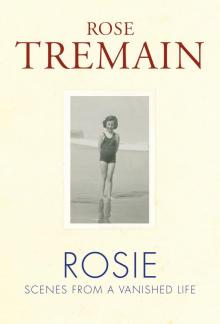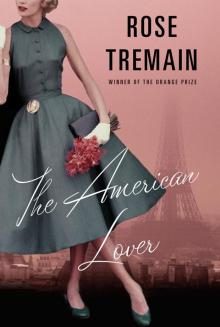- Home
- Rose Tremain
The American Lover Page 11
The American Lover Read online
Page 11
We could do nothing except lie still and petrified, clinging to each other. Neither of us dared whisper even a word. We were as terrified as soldiers hiding in a shallow bunker from an enemy who was about to blow our lives away. I could feel that Miss du Maurier was on the very edge of breaking down into sobbing and I clamped my arms more tightly around her.
I do not know how long we had to stay like this, cleaving together, aware of Death stalking us round and round. But at last, we heard the footsteps retreating and then fading to silence.
We got up and crept about the place, putting on our clothes.
We did not speak. I pinned up my hair, which was perfumed with my lover’s scent.
Later, in the blackest darkness, we walked out and went towards the boat. I looked up at the sky, to see if the moon was up to guide Miss du Maurier on her sea journey, but there was no moon.
‘Take care,’ I whispered. I touched her face, but she pulled back from my touch and only looked at me with sorrow and devastation, as though I were some animal she had inadvertently wounded. We pushed the boat out and she got into it and started the motor and drew up the anchor and I stood alone on the beach listening to the ticking sound of the engine and the slap of the water as she pulled further and further out into the bay.
What did I expect?
In my love for her, and with my knowledge of her world, I expected her to leave me for a while. I knew that one Thursday would pass and then another and another and she would not come to the summer-house. But I also expected that, in the end, she would come, that she would not be able to resist, that the ‘boy’ in her would not forever be confined in his coffin but start to long again for my touch. And so I waited for her. I waited and she did not come. As each week passed, I waited with a fainter and fainter heart.
I began letters to her, but did not send them. I lay in my little room, with my chinchilla coat wrapped around me, and I thought how my life in England, in the service of others more fortunate than me, and for whom I waited endlessly to know their will, had been, in its essence, a mistaken life.
So convinced of this did I become that, in the cold of February, when I at last admitted to myself that Miss du Maurier – in her terror of being discovered with me and of being shamed for this by the world in which we both had to live and breathe – would never return to the summer-house or seek me out anywhere, I went to see Lord de Whithers and told him that I had decided to leave Manderville Hall.
‘Leave?’ he said. ‘Leave? My dear woman, nobody leaves Manderville Hall unless they’re chucked out on their ear. Whatever are you thinking of? Where are you to find better employment in more beautiful surroundings than here?’
‘Nowhere, m’lord,’ I said. ‘I have been very fortunate at Manderville. It is something else.’
‘Something else? What d’you mean, Mrs Danowski?’
‘Well, sir, it is this. I have a little money saved. I am going to Padstow to set myself up in a small way . . .’
‘Set yourself up? What can you possibly be talking about?’
‘In a small commercial enterprise. I was taught to sew by my father who, as you know, was a tailor by profession.’
‘Yes. A Jew tailor. But I thought you had got beyond all that. I thought we had rescued you from that.’
‘Rescued me?’
‘From that Jew business. Because I’ve told you before, it’s best to forget all that – especially with the hardening of attitudes in Germany and so forth that we hear about now. Better to meld in. Let me remind and warn you. Far better to meld in here at Manderville, as you have done very well, and just put all that behind you.’
I was standing as straight and tall as I could in the drawing room, but now I felt a little dizzy and had to reach out and hold onto the back of a fragile Louis XVI chair upholstered in blue brocade.
‘I understand what you’re saying, Lord de Whithers,’ I said, ‘but the truth is that I am who I am and I will never be anyone else. Never. And, before it’s too late, I would like to try to run an independent life.’
Lord de Whithers began scratching his head. His look was now very severe. ‘Independent life!’ he scoffed. ‘Independent life? Do you know what on earth you’re saying? Do you know how much you’ve been protected here?’
‘Yes, I think I do, sir.’
‘Well then, how are you going to survive – without Manderville food, without Manderville light, without Manderville money and hot water and allowances for your clothes, not to mention the fresh air that you breathe and the freedom that you have to walk where you will in the park and by the sea and, most importantly, my willingness to overlook you origins? You tell me how.’
My dizziness was now so troubling, I thought that I might fall down in a faint. I clutched at the insubstantial chair. I knew that my voice was almost inaudible as I said: ‘I have been told that in Padstow, as in other towns, no doubt, in these times we are living through, there is a return to mending. People cannot afford new clothes as they did in the nineteen twenties, so there is a return to having old things made new by needlework. And I am very skilled at this, as your late wife knew. I used to mend Lady de Whithers’ underwear and petticoats if they had been inadvertently torn.’
‘Torn? Torn? What d’you mean? They were never torn. Torn by what or by whom?’
‘I don’t know, sir. But I am very skilled at what they now call “invisible mending”. And I have found a small shop to rent. I will take in old and torn things and try to make them serviceable by my skill.’
Lord de Whithers stared at me for a moment, then picked up his copy of the Daily Telegraph and resumed his reading of it.
‘What you’ve told me, Mrs Danowski, is all complete, unadulterated nonsense,’ he barked. ‘I can’t be doing with it. So either you must retract it all or you had better leave as soon as possible.’
The year I left Manderville Hall was 1937.
It was a cold February day, but before my taxi arrived, I went down to the beach and opened the door of the summer-house and went in.
I had cleaned and aired it after that last afternoon with Miss du Maurier, and yet it seemed to me exactly as it had been when we lay together on the daybed, and I longed to take a photograph of it, so that I would never forget it. I imagined myself old, staring at the faded picture and remembering that this place had contained all that I would ever know of love. Then I closed it and locked the door. I looked out at the bay and saw, far out, a small boat making its way round the headland on a calm sea. There were children in the boat and I could hear their laughter, carried towards me by the breeze.
My little enterprise, Danni’s Invisible Mending, located on Padstow high street, next door to a fish shop, was sufficiently successful to provide me with an income equal to my needs.
I had bought myself a solid and beautiful Singer Sewing Machine, with a foot treadle beneath the ironwork table.
I decided to position myself, with the machine, in the window – so that passers-by could observe for themselves how busy and industrious I was.
Some people entered the shop out of curiosity, to observe my skill close up. And one day the following year, 1938, a well-dressed woman came in and, smiling, said she had mistaken me for waxwork or a mannequin, because I sat so still.
‘No, no,’ I said. ‘I am quite real. And I undertake repair work of all kinds. I’ve recently acquired an elasticated thread, made in France, with which I can repair corsets and girdles, if that might be your wish.’
This woman now stared at me. She was a tall and beautiful lady with a fox fur draped about her shoulders.
‘I’m sorry,’ she said, ‘but your face is very familiar to me. Where might I have seen you before?’
I put down my work. ‘I don’t know,’ I said. ‘For many years I was housekeeper at Manderville Hall and—’
‘That’s it!’ she said. ‘We came to a ball at Manderville when Lady de Whithers was alive. I remember you. You glided about everywhere, making sure that everything was jus
t-so. And I said to Lady de Whithers, “Your housekeeper is clearly a marvellously committed person. I don’t suppose you’d lend her to me if I ever give a ball?”’
‘Ah,’ I said. ‘And what did Lady de Whithers say?’
‘She said, “Certainly not! We rely on her absolutely. Without her, Manderville would descend into disorder and chaos.” But now you’re here. I expect poor old Lord de With misses you terribly.’
‘I don’t know, madam. I don’t suppose he does.’
‘Ah well, things change. Nothing lasts for ever. But they say Manderville Hall has been immortalised in a book, and I was just on my way to the library—’
‘Immortalised?’
‘That’s what I heard. This new novel, Rebecca, by Daphne du Maurier. She calls the house “Manderley”, but they say that Manderville Hall was really the prime inspiration for the setting. Who knows if that’s true?’
I sat very still. A shaft of pale sunlight came through the window and glinted on the black sewing machine. Then I said: ‘I met Miss du Maurier once. She came to lunch with Lord de Whithers. I thought she was a very beautiful person.’
The library told me that I would have to wait at least a fortnight to get a copy of Rebecca. The book had been hailed as Daphne du Maurier’s finest work and it was in great demand.
So I waited. I was not much in the habit of reading, for in all my life’s work I’d felt tired at the end of each day and I often fell asleep with a book in my hand. But I wanted to read Rebecca. I had the fanciful notion that, by setting the novel at Manderville Hall, Miss du Maurier might, somewhere in the book, contrive to send me a coded message, a message that revealed how strong and true her feelings for me had been.
But then I acquired the book.
My foolish thought about a ‘coded message’ only betrayed what a naïve person I was in my heart. For I soon enough discovered myself in the novel’s horrible mystery. Not ‘Danni’ who had been loving and tender, but ‘Danny’, the ‘black figure’, Mrs Danvers, with vampire’s eyes and a white face, like a skull; Mrs Danvers, who is ugly and diseased with jealousy and wears her dark hair piled upon her head; Mrs Danvers who tortures Mr de Winter’s young bride by invoking the beauty of his former wife, Rebecca, by opening a wardrobe in her bedroom ‘in the west wing’ and showing her Rebecca’s dresses and furs; Mrs Danvers, who – in her obsession with the drowned and beautiful Rebecca – never ceases to scheme and plot and lay traps for the hapless heroine, and who, at the end of it all, burns down the house and everybody and everything inside it.
I returned the book to the library. It was difficult for me to utter a word about it, but I did manage to tell the librarian that I had not liked it at all.
All of this happened a long time ago, before the war came and destroyed so many lives, and I have to tell myself that I am lucky to be alive and running my little mending business and to be the owner of a chinchilla coat.
But I know that I have been physically affected by Miss du Maurier’s decision to make a villain out of me. My skin is very white and dry and the bones of my skull are clearly visible beneath this white skin. I think I am probably frightening to look at, ugly in fact, as ugly as she made me in the book.
I examine my features for signs of evil. I ask myself whether, one day, I shall not take some bitter revenge upon Miss du Maurier, who stole my name and my soul and made me bad. But I doubt that I will, because sometimes I dream that, after I left Manderville Hall, she came once more to the beach.
I dream that she found the summer-house locked and shuttered.
I dream that she tried to peer in through the curtained windows, as Adelaide Waverley had done. I tell myself that she walked up to the house and waited until Lord de Whithers rose from his afternoon rest and then asked him whether she might see me. And of course Lord de Whithers told her that I was gone – gone without leaving any forwarding address.
I dream that it was this – this knowledge that she would never find me because I did not want to be found – that wounded her so deeply that she decided, in her novel, to turn me into a monster.
These things I dream, lying in my room, listening to the sound of the sea. But I will never know the truth of what she felt. I know only that the novel, Rebecca, has now been read by millions of people all over the world. And I am at the heart of it, the evil spirit of Manderley, the jealous destroyer.
Sometimes, I remember what the librarian said when I told him that I disliked the novel.
‘You’re in a minority,’ he sniffed. ‘Rebecca is a triumph, possibly a masterpiece.’
Smithy
His name was Reginald Smith, but people always called him Smithy. And, as he aged, the name ‘Reginald’ moved away backwards in time and attached itself to a thin boy, once photographed alone on a beach, holding in his hand a miniature Union Jack. At the boy’s feet was a sandcastle, surrounded by a frail wall of shells. Beyond the limits of the picture, raged the cold North Sea.
Every day now, through every season, Smithy went for the same walk. He was eighty years old, but an upright man. He walked down to his garden gate and let himself out into the road and trod this road for a quarter of a mile, then turned left and climbed a stile into a green lane, known as Blackthorn End. After a few steps, the quiet of Blackthorn End would gather itself around him. On either side of the path, poplars grew. In front of the poplars were hedges of holly and hawthorn and dog-rose. Beyond the trees, were meadows where horses grazed and these horses would often amble to their wire fence and stare at Smithy, and he would stop and listen to their breathing. Sometimes, in this moment of stillness, he would find himself thinking about Reginald, with his miniature flag, and how, on that same beach, Reginald had once been lifted onto the back of a pony. He’d held onto the pony’s coarse mane while a man led the animal up and down under a hot sun. This burning sun had felt so heavy on Reginald’s neck and back, he’d begun to lean further and further forwards until he lost his footing in the stirrups and the man had shouted, ‘Sit up, boy! Sit up!’ and he’d felt afraid. And afterwards he’d been ill for a while and lain in a room somewhere, in some unfamiliar room, and his mother had come and gone with bowls of custard. ‘Lovely custard,’ she’d said. Come and gone with her lovely custard and then disappeared for ever. And after that, what? He couldn’t remember exactly. His life just going on, he supposed: that solitary thing, his life as ‘Smithy’.
Though Smithy enjoyed watching and listening to the horses, he never stopped for long at the top of Blackthorn End, because he had a task to perform. He’d appointed himself the guardian of the lane. Every day, he removed from it anything left behind by other people: chocolate wrappers, lager cans, cigarette stubs, plastic bottles and carrier bags. Condoms. The days when there was nothing to pick up were few. Smithy put all this garbage into a garden refuse sack and took it home, where he sorted it according to the council’s Recycling Instructions, and then, tired from his walk, he sat down in an old armchair and fell asleep. Sometimes, he dreamed he was working once again at the last job he’d had before his long-delayed retirement, planting trees on motorway verges and cuttings and embankments: row upon row of thin saplings in green protective tubing on a vale of earth that seemed, on certain days, to be as endless and as heartless as the Great Wall of China. Looking down the line of his fellow workers on this job, Smithy had once remarked to the man next to him that the group resembled a chain-gang from the American South. The man was black and young and strong. He’d straightened up and stared down at the roaring traffic on the six-lane road and said: ‘Are you, like, living in the past, Smithy?’
‘Probably,’ Smithy had replied, ‘but don’t worry, lad. I’ll be put out to grass soon.’
On a February afternoon, with the horses gone from the meadows and a cold rain falling, Smithy saw something enormous and unfamiliar lying by the dog-rose hedge, halfway along Blackthorn End. Upright and slow, he walked towards it. Its colour was a dull purple and it looked bloated by the winter damp. It was a bro
cade-covered mattress. Smithy looked down at it. The brocade was torn along one of its edges and, from this rent, an evacuation of grey-white stuffing emerged. Smithy turned and stared at the lane behind him – the bit of Blackthorn End he’d just walked – as though there might be some clue here as to how and why the repulsive mattress had arrived at this spot. He stood absolutely still for some while, shifting his gaze from the lane unravelling behind him to the purple mattress lying there in front of him. He felt sick and troubled. The rain kept falling. He put his hands in the pockets of his tweed coat to try to warm them. Then, instead of completing his walk, he went home.
He hung his damp clothes across the backs of chairs in front of his kitchen range and ran himself a bath. He soaped his body, and then lay there in the bath, watching the steam put a grey bloom on the window. He stared at the tops of his feet, sticking up like mouldy rock-cakes from the cream of scummy water. And he thought how, occasionally in his life, things weren’t what they seemed to be – just as his feet were not rock-cakes and nor were the motorway workers part of a chain-gang – and that what he’d imagined to have been a mattress lying in the green lane was, in fact, something else? But what could that ‘something’ possibly be?
The following day was bright and, as usual, after his lunch of bread and butter and pickled beets, Smithy tugged on his coat and his boots and set out for his walk, with the refuse sack stuffed into his pocket. His lunch felt sour in his stomach. Though he’d never believed in any Saviour of Mankind, he found himself stupidly praying, ‘Let that thing not be there.’ More than this, he wanted it never to have been there. He much preferred to admit that he’d had a moment of senile hallucination than that there should be something so disgusting and out of place lying halfway along his precious Blackthorn End.

 Rosie
Rosie The Garden of the Villa Mollini
The Garden of the Villa Mollini Merivel: A Man of His Time
Merivel: A Man of His Time The Darkness of Wallis Simpson
The Darkness of Wallis Simpson Earth
Earth Sacred Country
Sacred Country The Swimming Pool Season
The Swimming Pool Season The Gustav Sonata
The Gustav Sonata Sadler's Birthday
Sadler's Birthday The Cupboard
The Cupboard The American Lover
The American Lover Letter to Sister Benedicta
Letter to Sister Benedicta Evangelista's Fan
Evangelista's Fan Restoration
Restoration The Road Home
The Road Home The Colonel's Daughter
The Colonel's Daughter The Way I Found Her
The Way I Found Her Music & Silence
Music & Silence